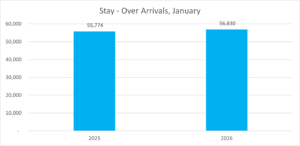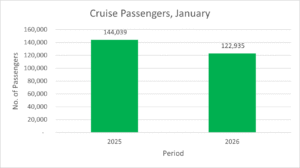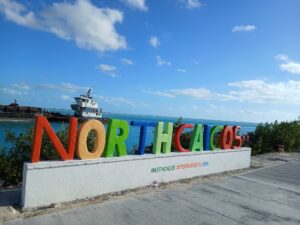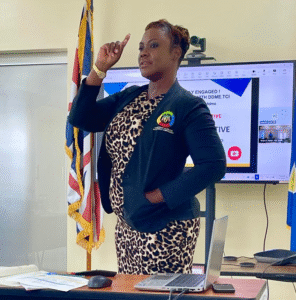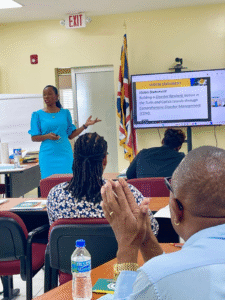PROVIDENCIALES, Turks & Caicos Islands: Lashiko Seymour’s success story is rooted in humble beginnings. His life’s journey highlights the value of mentors and speaks to the transformative impact of resilience, dedication, and a strong work ethic.
Lashiko was born in South Caicos, Turks and Caicos Islands. As a youngster he had to relocate to Providenciales when his parents moved in search of work. Resources weren’t always plentiful but values of gratitude and the will to achieve were reinforced daily.
achieve were reinforced daily.
Throughout his high school years at Clement Howell, Lashiko aspired to becoming a professional basketballer. However, those dreams were short lived. Upon completing his secondary studies, he attended the Turks and Caicos Islands Community College where he did a hospitality course, after which he received a scholarship to Johnson and Wales University in Miami where he obtained a degree in Hotel Management.
Lashiko recounts his time in university as the first major turning point in his life. “I always understood the value of education but throughout high school I never put out any extra effort. It was when I got to university that I started to take my education seriously. Money was ‘tight’, especially when the scholarship funding was reduced. It was at that point that I decided that I would pick up more courses and finish ahead of time.” He fondly recalls the moment he had called the Department of Education and spoken with the lady in charge of the grants and scholarships.
When he had asked if he could take on some additional courses the lady was pleasantly surprised, acknowledging that he was the first scholarship recipient that had ever made such a request. This very mature decision on his part, would also benefit future recipients because his early completion would allow other persons to receive benefits sooner rather than later. When many persons at that stage of their lives would have been feting and enjoying college life, Lashiko was doubling down on his studies. He was focused on returning home with his degree so that he could help improve the quality of life of his family.
When asked why he did not seek employment in the United States, without hesitation he calmly yet proudly responded, “I rather be home. This is where I am comfortable.” Lashiko urges other young men and women who go abroad to pursue further studies not to abandon their home. “Turks and Caicos is our home and if we leave to certify ourselves and gain various credentials, we must be prepared at some point to return to contribute to the development of our home.”
Lashiko’s career in the hospitality industry began in 2010 when he joined Beaches Turks and Caicos as a front desk clerk. Eleven months in, he was promoted to night auditor where he served for an additional year and two months. It was at this point that he had a life altering experience. “Being a part of such a large organization, it is easy to remain in obscurity, especially when working the night shift like I did. We come in, we get things done but no one really sees us in operation. At least, that is what I thought before getting perhaps the most profound career advice of my life. In an exchange with one of the administrators from Sandals Resorts International, she told me to make my presence felt so that when my resume hits the desk of the managers, they will already know who I am. From that moment onward I became more assertive, I started to do things a bit more differently which left a lasting impression on those I encountered. I was no longer just a night auditor. People knew me by name.”
This is a winning principle for anyone starting a career to adopt. Additionally, he is grateful for the opportunities that the Sandals Corporate University (SCU) has provided for continued training and development. Through the SCU, he believes that every member of staff has an opportunity to get certified in mandatory courses as well as programmes of their choice, at no cost to them.
It’s one thing to receive advice but it takes someone who is humble and receptive to learning to take these golden nuggets of wisdom and apply them. At twenty-three years old, Lashiko was fortunate to have not one, not two, but three men, in addition to his father, offering advice on career choices, investment among other things. In fact, he credits his success to three of his mentors; Gerald Williams, Kenneth Hamilton and Ben Williams who were night managers at Beaches. “They were always on my case pushing me to pursue my goals. Because of them, I was motivated to acquire property at an early age, build my home and now I can provide financial security for my family.”
credits his success to three of his mentors; Gerald Williams, Kenneth Hamilton and Ben Williams who were night managers at Beaches. “They were always on my case pushing me to pursue my goals. Because of them, I was motivated to acquire property at an early age, build my home and now I can provide financial security for my family.”
Having applied the wise counsel of his mentors, Lashiko is now comfortably enjoying the fruits of his labour. During the day he has the pleasure of taking care of his nine month old son. In his leisure time he enjoys watching basketball, comedy and action films. He notes that the advantage of working on the night shift is that he has ample time to spend with his family during the day.
Lashiko urges young people entering the hospitality industry to foster relationships with persons who can pass on positive values. “Sometimes you can spare yourself a lot of trouble when you listen to your elders. That is what saved me. Now I am able to mentor others, and I do not take this responsibility lightly.”
Lashiko Seymour, is an exemplary son of the soil. He is a dedicated family man and team member. His past challenges have equipped him with a spirit of resilience that fuels his desire for success on the job. His journey is a testament to the positive impact of mentorship, the unwavering pursuit of knowledge and the ability to overcome financial obstacles in pursuit of a brighter future.
Captions
Header: Lashiko Seymour, Senior Manager on Duty at Beaches Turks and Caicos resort makes his final look at some documents prior to him checking with the different departments on the resort
1st insert: Senior Manager on Duty at Beaches Turks and Caicos, Lashiko Seymour
2nd insert: Lashiko Seymour, Senior Manager on Duty at Beaches Turks and Caicos shares his mentorship skills with Concierge Agent Brianna Simon as they go through some assigned tasks
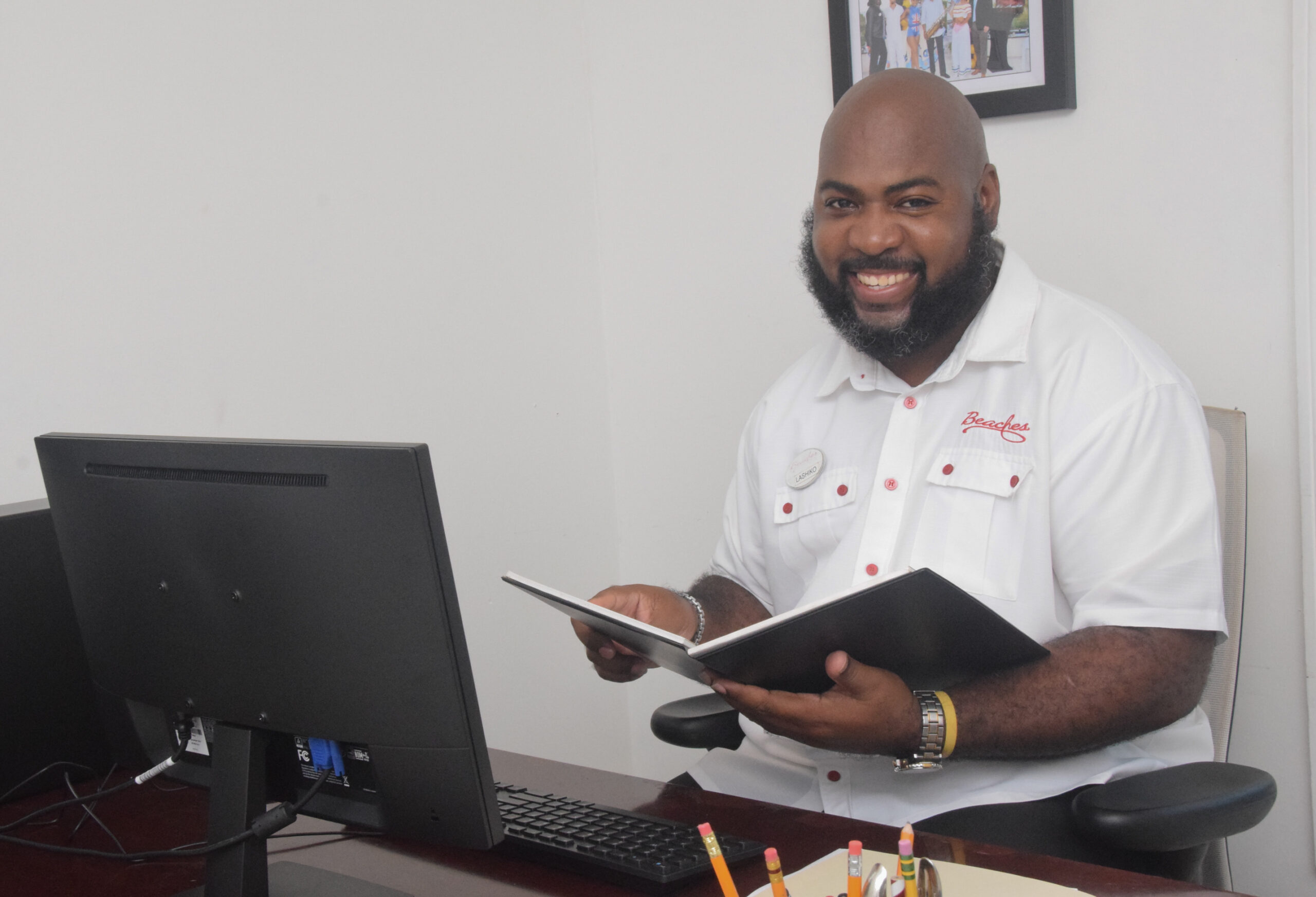


 News6 days ago
News6 days ago
 Caribbean News1 week ago
Caribbean News1 week ago
 News6 days ago
News6 days ago



